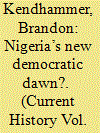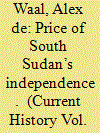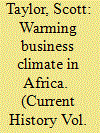|
|
|
Sort Order |
|
|
|
Items / Page
|
|
|
|
|
|
|
| Srl | Item |
| 1 |
ID:
138404


|
|
|
|
|
| Summary/Abstract |
In December 2007, claims that Kenya’s incumbent president, Mwai Kibaki of the Party of National Unity (PNU), had stolen an election won by his opponent, Raila Odinga of the Orange Democratic Movement (ODM), triggered unprecedented violence that led to the death of over 1,000 people and the displacement of almost 700,000 others in two months. The violence took several forms, including countrywide demonstrations by opposition supporters; a heavy-handed state security response; attacks on ethnic communities deemed pro-government (mainly Kikuyu and Kisii), the epicenter of which was the Rift Valley; and counterattacks by Kikuyu youth against communities deemed pro-opposition (mainly Luo and Kalenjin) in the towns of Nakuru and Naivasha in the Central Rift Valley. It was the last two forms of violence that became the focus of two cases at the International Criminal Court (ICC) in The Hague, after a national Commission of Inquiry into the Postelection Violence (CIPEV) insisted that those most responsible be held accountable but the Kenyan government failed to establish a special tribunal as the commission recommended.
|
|
|
|
|
|
|
|
|
|
|
|
|
|
|
|
| 2 |
ID:
138402


|
|
|
|
|
| Summary/Abstract |
On March 28, 2015, Nigerians returned to the polls to elect a president for the fourth time since the 1999 democratic transition. Nigeria’s Fourth Republic (1999-present) has lasted far longer than any previous attempt at civilian rule in this country of more than 175 million, encompassing an era of both remarkable growth (following a 2014 recalculation of GDP with more inclusive data, it officially surpassed South Africa as the continent’s largest economy) and worrisome social conflict. Indeed, it is possible to see Nigeria as both a rapidly modernizing success story and a deeply troubled state in which more than 35,000 citizens have died in politically motivated violence over the past four years. While its foreign direct investment inflows ($5.6 billion in 2013) put it in the company of advanced nations like France and Japan, it joins Syria, Iraq, Pakistan, and Afghanistan in a group of five countries that accounts for 80 percent of the world’s deaths from terrorism.
|
|
|
|
|
|
|
|
|
|
|
|
|
|
|
|
| 3 |
ID:
138406


|
|
|
|
|
| Summary/Abstract |
When they celebrated independence on July 9, 2011, the people of South Sudan hoped that the fundamental problems that had doomed the united nation of Sudan over the previous 55 years had finally been resolved. At long last, as citizens of their own independent sovereign nation, South Sudanese would no longer be a minority subject to racial and religious discrimination, and robbed of their immense natural resources—water, farmland, and oil—by northern compatriots, who often bore a greater resemblance to colonizers than fellow citizens.
|
|
|
|
|
|
|
|
|
|
|
|
|
|
|
|
| 4 |
ID:
138403


|
|
|
|
|
| Summary/Abstract |
Almost six months after the peak of the West African Ebola outbreak, it is becoming hard to remember the panic and confusion that gripped the United States during the summer and fall of 2014. Using models that have since been discredited, the Centers for Disease Control tentatively projected that there would be up to half a million cases by January 2015. Health care workers returning from the affected region were threatened with involuntary quarantine, and schoolchildren with connections to African countries thousands of miles from the outbreak were asked to stay home. The United Nations passed a unanimous resolution declaring Ebola a “threat to international peace”; meanwhile, US President Barack Obama determined that only a military response could manage the logistics of containing the epidemic. The media focused relentlessly on the heroism of European and American responders and fell back on stock images of Africans as helpless, hapless victims who were nonetheless stubbornly resistant to Western medicine, irrationally carrying on with “secret burials,” and then getting on planes and spreading the disease to unsuspecting places like Dallas.
|
|
|
|
|
|
|
|
|
|
|
|
|
|
|
|
| 5 |
ID:
138405


|
|
|
|
|
| Summary/Abstract |
Nationalism in Africa is often dismissed as artificial—not reflecting “real” nations, or, more cynically, organized by political elites solely to achieve and maintain power. Because of this presumed artificiality of national ties, at independence new states were seen as unlikely to survive, and cases of state collapse have been interpreted as proof that cynicism was merited.
|
|
|
|
|
|
|
|
|
|
|
|
|
|
|
|
| 6 |
ID:
138401


|
|
|
|
|
| Summary/Abstract |
According to a variety of metrics, business is booming in sub-Saharan Africa. Foreign direct investment (FDI) has increased steadily, from a mere $2.8 billion in 1990 to $57 billion in 2013. Programs that extol both the household and economy-wide benefits of entrepreneurship have proliferated, and a new generation of African business magnates serves as role models for citizens and government officials on a continent that once saw business as anathema to national development priorities. This new capitalist ethos corresponds with other striking achievements. Gross domestic product rose by over 5 percent annually between 2000 and 2014, and growth is forecast to remain in the range of 4-5 percent for the next several years.
|
|
|
|
|
|
|
|
|
|
|
|
|
|
|
|
|
|
|
|
|